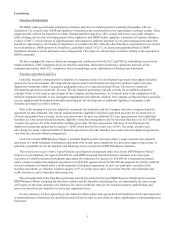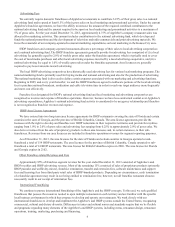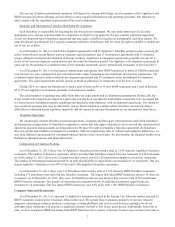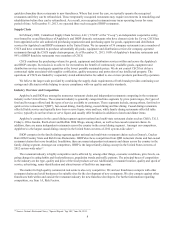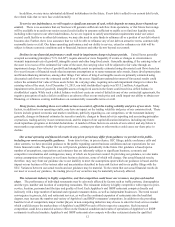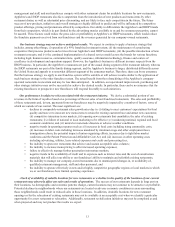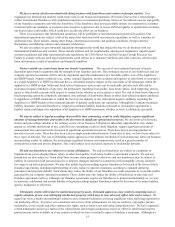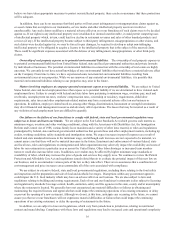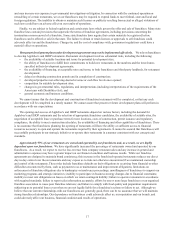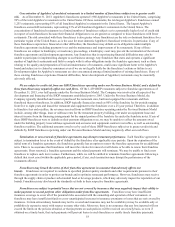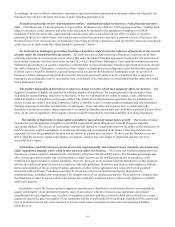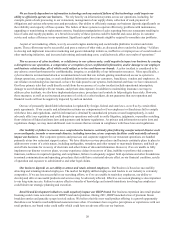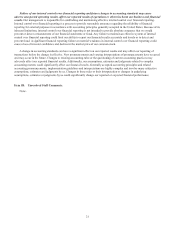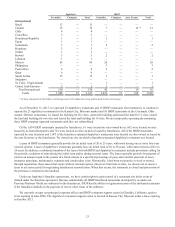IHOP 2013 Annual Report Download - page 35
Download and view the complete annual report
Please find page 35 of the 2013 IHOP annual report below. You can navigate through the pages in the report by either clicking on the pages listed below, or by using the keyword search tool below to find specific information within the annual report.14
A failure to address cost pressures, including rising costs for labor, food commodities and utilities used by our and our
franchisees' restaurants, and a failure of the Co-op to effectively deliver cost management activities and achieve economies
of scale in purchasing, may compress our franchisees' operating margins and adversely affect our and our franchisees'
business results. Our and our franchisees' business results depend highly on the ability to anticipate and react to changes in the
availability and pricing of food commodities, utilities, and other related costs over which we may have little control. Operating
margins for our and our franchisees' restaurants are subject to increases in labor costs mandated by health care laws,
employment laws, immigration reform, union organizing efforts and labor market conditions. In addition, our and our
franchisees' operating margins are subject to changes in the pricing and availability of beef, pork, eggs, cheese, coffee and
produce. We attempt to leverage our size to achieve economies of scale in purchasing through the Co-op, but there can be no
assurances that we can always do so effectively. We are subject to the general risks of inflation. Restaurant operating margins
are also affected by fluctuations in the price of utilities such as electricity and natural gas, whether as a result of inflation or
otherwise, on which the restaurants depend for their energy supply. Our inability to anticipate and respond effectively to any of
these cost pressures could have an adverse effect on our business results.
We may experience shortages or interruptions in the supply or delivery of food and other products from third parties or
in the availability of utilities. Our franchised and company-operated restaurants are dependent on frequent deliveries of fresh
produce, food, beverage and other products. This subjects us to the risk of shortages or interruptions in food and beverage
supplies which may result from a variety of causes including, but not limited to, shortages due to adverse weather, labor unrest,
political unrest, terrorism, outbreaks of food-borne illness, disruption of operation of production facilities, the financial
difficulties, including bankruptcy, of our suppliers or other unforeseen circumstances. Such shortages could adversely affect our
revenue and profits. The inability to secure adequate and reliable supplies or distribution of food and beverage products could
limit our ability to make changes to our core menus or offer promotional "limited time only" menu items, which may limit our
ability to implement our business strategies. Our restaurants bear risks associated with the timeliness of deliveries by suppliers
and distributors as well as the solvency, reputation, labor relationships, freight rates, prices of raw materials and health and
safety standards of each supplier and distributor. Other significant risks associated with our suppliers and distributors include
improper handling of food and beverage products and/or the adulteration or contamination of such food and beverage products.
Disruptions in our relationships with suppliers and distributors may reduce the payments we receive from our franchisees or
our pancake and waffle dry mix distributors or the profits generated by our company-operated restaurants. In addition,
interruptions to the availability of gas, electric, water or other utilities may adversely affect our operations.
A failure to develop and implement innovative marketing and guest relationship initiatives, ineffective or improper use
of social media or other marketing initiatives, and increased advertising and marketing costs, could adversely affect our
business results. If our competitors increase their spending on advertising and promotions, if our advertising, media or
marketing expenses increase, or if our advertising and promotions become less effective than those of our competitors, we
could experience a material adverse effect on our business results. A failure to sufficiently innovate, develop guest relationship
initiatives, or maintain adequate and effective advertising could inhibit our ability to maintain brand relevance and drive
increased sales.
As part of our marketing efforts, we rely on search engine marketing and social media platforms to attract and retain
guests. These efforts may not be successful, resulting in expenses incurred without the benefit of higher revenues or increased
employee engagement. In addition, a variety of risks are associated with the use of social media, including the improper
disclosure of proprietary information, negative comments about our brands, exposure of personally identifiable information,
fraud, or out-of-date information. The inappropriate use of social media vehicles by our franchisees, guests or employees could
increase our costs, lead to litigation or result in negative publicity that could damage our reputation. These efforts may not be
successful, and pose a variety of other risks, as discussed below under the heading: “We rely heavily on information technology
in our operations, and insufficient guest or employee facing technology, or any material failure, inadequacy, interruption or
breach of security of any of our technology, could harm our ability to effectively operate our business.”
Changing health or dietary preferences may cause consumers to avoid Applebee's and IHOP's products in favor of
alternative foods. The food service industry as a whole rests on consumer preferences and demographic trends at the local,
regional, national and international levels, and the impact on consumer eating habits of new information regarding diet,
nutrition and health. Our franchise development and system-wide sales depend on the sustained demand for our products,
which may be affected by factors we do not control. Changes in nutritional guidelines issued by the United States Department
of Agriculture, issuance of similar guidelines or statistical information by federal, state or local municipalities, or academic
studies, among other things, may impact consumer choice and cause consumers to select foods other than those that are offered
by Applebee's or IHOP restaurants. We may not be able to adequately adapt Applebee's or IHOP restaurants' menu offerings to
keep pace with developments in consumer preferences, which may result in reductions to the franchise payments we receive
from franchisees and the revenues generated by our company-operated restaurants.



